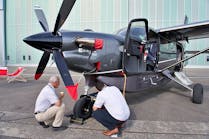BLR Announces Certified Performance Improvements for Winglet-Equipped King Airs
Orlando, FL., Oct. 20, 2014 — The Federal Aviation Administration (FAA) has approved a Flight Manual Supplement that certifies significant performance improvements for King Air 200 aircraft equipped with Winglet Systems from BLR Aerospace. The certified data shows up to a 30 percent reduction in runway length requirements and useful load increases up to 1,000 pounds. The same approval for King Air 90s is imminent.
The announcement coincides with the milestone sale of BLR’s 700th Winglet System, part of a five-shipset order from Business and Commuter Aircraft in Lyon, France, according to Dave Marone, Vice President of Sales and Marketing for BLR.
“The FAA has validated the aerodynamic properties of the Winglet System and its ability to provide meaningful and measurable performance improvements,” Marone said. “This is great news for the King Air operating community and for BLR.” Lightweight composite Winglets reduce drag and enhance low-speed handling, enabling these now-certified improvements in runway performance and carrying capacity.
Detailed performance numbers for Part 135 and Part 91 operators flying King Air 200 aircraft equipped with PT6A-41 or -42 engines are available from BLR representatives in Exhibit 1020 during the National Business Aviation Association (NBAA) Annual Meeting and Convention, Oct. 21-23, in Orlando, Fla.
A package of improvements for King Air 200GTs, including Winglets, is already certified and was developed in partnership with Beechcraft Corporation. BLR Winglet Systems are in production as OEM standard equipment on the King Air 90 GTx and King Air 250.
“The FAA has confirmed what a great many King Air pilots already knew,” Marone said. “Winglets are a smart, cost-effective investment. From more runway access and faster climbs, to better safety margins and speed, they improve virtually every aspect of flight.” The Aircraft Blue Book documents that Winglets deliver a 100 percent return on investment.
Winglets increase wingspan (by three feet five inches) as well as wing aspect ratio, lowering induced drag. Winglets also act as a physical pressure barrier, which conserves valuable lift at the outboard extremities.

